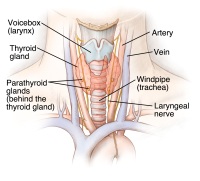The Thyroid Gland
Anatomy of the thyroid gland

Thyroid Gland - Click to Enlarge
The thyroid gland is found in the front of the neck. It sits below the voice box (larynx) and on top of the trachea (windpipe). It has a butterfly-like shape. The small, 2-inch gland consists of 2 lobes, 1 on each side of the windpipe, connected by a small bridge of thyroid tissue called the isthmus.
The thyroid tissue has 2 types of cells: follicular cells and parafollicular cells. Most of the thyroid tissue consists of follicles lined by the follicular cells. These secrete the iodine-containing thyroid hormones.
Thyroid hormones
The hormones made by the thyroid consist 80% of thyroxine (T4) and 20% of triiodothyronine (T3) and calcitonin. T3 and T4 increase your basal metabolic rate. They make all the cells in the body work harder, which affects things like body temperature, heart rate, bowel function, and many more. The parafollicular cells secrete the hormone calcitonin. In humans, calcitonin has only a minor role in calcium regulation. These hormones are secreted by the thyroid when our bodies need them. The pituitary gland, found in our brain, helps regulate this process.
Functions of the thyroid gland
The thyroid plays an important role in regulating the body's metabolism. The hormones it secretes help many functions of the body like how the body makes heat, consumes oxygen, and uses energy. Nearly every tissue in the body is affected or regulated by thyroid hormone. It controls the brain and nerve development and function and skin, hair, eyes, heart, and intestine function. The thyroid hormones enter into tissues and regulate how those tissues make or don't make certain proteins. The thyroid function is controlled by the pituitary, which sits at the base of the brain. The pituitary is controlled by a region in the brain called the hypothalamus. Thyroid disorders usually occur from the thyroid making either too much or too little hormone.